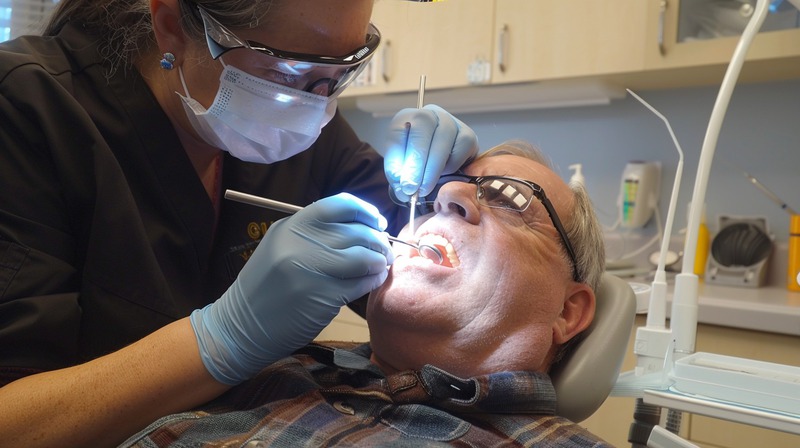
How Do Dentists Help with Sleep Apnea?
Sleep apnea affects millions worldwide, disrupting sleep and causing various related health issues. Dentists play a crucial role in diagnosing and treating sleep apnea by providing specialized oral appliances to keep the airway open during sleep. These devices offer a noninvasive alternative to traditional treatments, making dental professionals critical in managing this severe condition.
Dentists can play a crucial role in managing and treating sleep apnea, particularly for patients with obstructive sleep apnea (OSA), which is caused by the relaxation of throat muscles blocking the airway. Understanding how dentists help with sleep apnea can provide insight into effective management strategies and available treatment options.
1. Diagnosis and Evaluation
The first step in managing sleep apnea is a comprehensive evaluation. Dentists specializing in sleep medicine can perform an initial assessment to determine if sleep apnea is a concern. This often involves reviewing the patient’s medical history, discussing symptoms like snoring, daytime drowsiness, and difficulty concentrating, and assessing oral and facial anatomy. Dentists may collaborate with sleep specialists to refer patients for a sleep study (polysomnography) to confirm the diagnosis and determine the severity of the condition. For those considering surgical options, it is essential to learn everything you need to know about jaw surgery for sleep apnea, as this can be a critical step in finding the most effective treatment for long-term relief.
2. Oral Appliance Therapy
For patients with mild to moderate obstructive sleep apnea, dentists can provide oral appliance therapy. This treatment involves the use of a custom-made dental device that is worn during sleep. The appliance works by repositioning the lower jaw and tongue to keep the airway open, thereby reducing or eliminating interruptions in breathing. Dentists carefully design and adjust the appliance to ensure it fits comfortably and effectively.
3. Treatment Planning and Customization
Dentists play a critical role in developing and customizing treatment plans for patients with sleep apnea. They work closely with patients to understand their needs, preferences, and potential compliance issues. The treatment plan may involve the creation of a personalized oral appliance, adjustments to existing appliances, or a combination of therapies. Regular follow-ups are essential to monitor the effectiveness of the treatment and make necessary adjustments. You should also explore oral surgery services, which can provide additional support and solutions tailored to your specific condition to enhance your care.
4. Patient Education and Compliance
Education is a critical component of managing sleep apnea. Dentists provide patients with information about their condition, the role of oral appliances, and how to use and care for them properly. They also offer guidance on lifestyle changes that can complement the treatment, such as weight management, avoiding alcohol, and quitting smoking. Ensuring patients understand the importance of adhering to the treatment plan is crucial for achieving optimal outcomes.
5. Monitoring and Follow-Up
Effective management of sleep apnea requires ongoing monitoring and follow-up care. Dentists schedule regular appointments to assess the performance of the oral appliance, address any issues, and make adjustments as needed. They also collaborate with sleep specialists to review sleep study results and evaluate the overall effectiveness of the treatment. Continuous monitoring helps ensure that the patient’s sleep apnea is well-managed and that any necessary changes to the treatment plan are made promptly.
6. Management of Side Effects
While oral appliance therapy is generally well-tolerated, some patients may experience side effects such as jaw discomfort, dry mouth, or changes in dental alignment. Dentists are equipped to address these issues and provide solutions to alleviate discomfort. They can adjust the appliance or suggest alternative treatments to improve patient comfort and satisfaction.
7. Coordination with Other Healthcare Providers
Managing sleep apnea often requires a multidisciplinary approach. Dentists collaborate with sleep specialists, primary care physicians, and other healthcare providers to ensure comprehensive care. This teamwork helps address all aspects of the patient’s health and ensures that the sleep apnea treatment is integrated with other medical treatments and lifestyle recommendations.
8. Consideration of Alternative Treatments
Dentists may consider alternative or adjunctive sleep apnea options when oral appliance therapy is ineffective or suitable. These may include referral to an ear, nose, and throat (ENT) specialist for surgical options or continuous positive airway pressure (CPAP) therapy. Dentists work with patients to explore options and determine the most appropriate treatment.
9. Prevention and Management of Associated Health Issues
Sleep apnea is often associated with other health issues such as cardiovascular disease, hypertension, and diabetes. Dentists can help monitor and manage these related conditions by coordinating with other healthcare providers and providing guidance on how lifestyle changes can impact overall health. Addressing these associated conditions can improve the patient’s overall well-being and enhance the effectiveness of sleep apnea treatment.
10. Support and Encouragement
Managing sleep apnea can be challenging, and patients may need ongoing support and encouragement. Dentists play a supportive role by providing motivation, addressing concerns, and celebrating progress. They help patients stay committed to their treatment plan and make necessary adjustments to ensure long-term success.
Wrapping Up
Dentists are vital in managing and treating sleep apnea, mainly through oral appliance therapy and collaborative care. By diagnosing the condition, providing customized treatments, and offering ongoing support, dentists help improve the quality of life for patients with sleep apnea. Effective management of sleep apnea requires a comprehensive approach that includes regular follow-ups, patient education, and coordination with other healthcare providers. By working with a dentist, patients can achieve better sleep, reduce health risks, and enhance their overall well-being.
